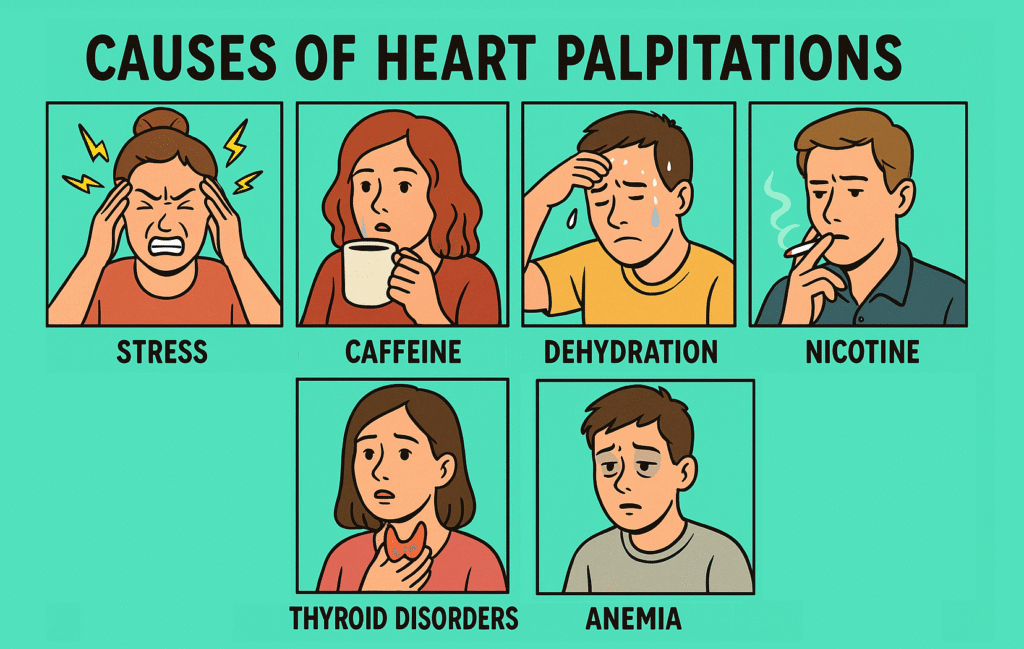Ever felt like your heart suddenly started racing, fluttering, or thumping loudly in your chest? That sensation is known as a heart palpitation — and while it can be scary, it’s not always dangerous. In many cases, palpitations are harmless and go away on their own. But sometimes, they can be a sign of something more serious.
Let’s explore what causes heart palpitations, what they feel like, who’s at risk, and how doctors diagnose and treat them.
What Are Heart Palpitations?
Heart palpitations are the feeling that your heart is:
- Beating too fast (called tachycardia)
- Skipping beats
- Fluttering or pounding
- Thumping irregularly
You might notice them in your chest, throat, or neck. They can last a few seconds or minutes — and sometimes even longer. Palpitations are surprisingly common. According to a review in American Family Physician, around 16% of people visiting a primary care clinic report experiencing them.
How Do Heart Palpitations Happen?
Normally, your heart has its own electrical system that keeps the rhythm steady — like a drummer keeping the beat in a band. But when something interferes with this rhythm, it can cause your heart to beat in an irregular or forceful way.
Think of it like a hiccup in your heartbeat — a skipped rhythm, an extra beat, or a faster pace. This can happen because of stress, stimulants, hormone changes, or underlying heart conditions. Sometimes it’s your body’s way of saying, “Hey, something’s off!”
What Causes Heart Palpitations?
Palpitations can stem from several things. Some are completely benign, while others need medical attention.
Common Causes (Around 90% are harmless):
- Stress and anxiety – heightened adrenaline can make the heart race.
- Caffeine – found in coffee, tea, energy drinks, and chocolate.
- Exercise – especially intense or sudden activity.
- Dehydration – low fluid levels can disrupt heart rhythms.
- Nicotine – from smoking or vaping.
- Medications – especially asthma inhalers or cold remedies with pseudoephedrine.
Hormonal Causes:
- Pregnancy
- Menopause
- Thyroid disorders – especially hyperthyroidism.
Medical Conditions:
- Arrhythmias – like atrial fibrillation (AFib).
- Heart valve problems
- Low blood sugar
- Anaemia
- Electrolyte imbalances – especially potassium, magnesium, or calcium levels.
Sometimes, the cause is never found — and that’s okay too.

Who’s at Risk?
Heart palpitations can happen to anyone, but some people are more likely to experience them than others.
You’re more at risk if you:
- Are under high stress or emotional distress
- Have panic disorder or anxiety
- Use caffeine or stimulant medications regularly
- Have a family history of heart rhythm disorders
- Have underlying heart conditions
Even athletes can get palpitations due to changes in heart size and rhythm from intense training.
Other Symptoms to Watch Out For
Palpitations might come alone, or with other symptoms. Most of the time, they’re just a sensation and not dangerous.
But you should see a doctor if you also have:
- Chest pain or discomfort
- Dizziness or fainting
- Shortness of breath
- Unusual fatigue
- Confusion
These could be signs of a more serious rhythm problem, especially if they come on suddenly or during activity.
How Are Heart Palpitations Diagnosed?
If you go to your doctor with palpitations, they’ll ask about:
- When it happens (e.g., after coffee or during stress?)
- How long it lasts
- What it feels like
- Whether you have other symptoms (like fainting or chest pain)
Electrocardiogram (ECG)
This simple test records your heart’s electrical activity using small patches on your chest. It only takes a few minutes and can catch irregular rhythms — but only if the palpitation is happening during the test.
Other useful tests include:
- Holter monitor – a 24- or 48-hour portable ECG device.
- Event recorder – worn for weeks to catch occasional irregular beats.
- Blood tests – to check thyroid levels, anaemia, or electrolytes.
- Echocardiogram – an ultrasound of your heart to check for structural issues.
- Stress test – done while exercising to see how your heart behaves.
Treatment for Heart Palpitations
The treatment depends on the underlying cause.
Benign in origin:
- Lifestyle changes can help a lot:
- Cut back on caffeine and alcohol
- Quit smoking or vaping
- Stay hydrated
- Manage stress with relaxation techniques, yoga, or therapy
Medical causes:
- Treating the underlying cause (like adjusting thyroid levels or controlling anaemia)
- Medications like beta-blockers or anti-arrhythmics may be prescribed
- Procedures, such as:
- Catheter ablation – if the palpitations are due to a specific electrical pathway
- Pacemaker or defibrillator – in severe cases
If anxiety or panic disorder is the cause, cognitive behavioural therapy (CBT) and medication might be recommended.
Final Thoughts
Most heart palpitations are nothing to panic about — they’re your heart’s quirky way of reacting to stress, caffeine, or excitement. But if they’re frequent, frightening, or come with other symptoms, don’t brush them off. Your heart is worth listening to.
Remember: you know your body best. If something feels off, get it checked.
References
- Palpitations: Evaluation and Management – American Family Physician, April 15, 2011. https://www.aafp.org/pubs/afp/issues/2011/0415/p743.html
- Mayo Clinic – Heart Palpitations. https://www.mayoclinic.org/diseases-conditions/heart-palpitations/symptoms-causes
- NHS – Heart Palpitations. https://www.nhs.uk/conditions/heart-palpitations/
- Harvard Health – The Truth About Heart Palpitations. https://www.health.harvard.edu/heart-health/the-truth-about-heart-palpitations
- Johns Hopkins Medicine – Palpitations. https://www.hopkinsmedicine.org/health/conditions-and-diseases/palpitations
